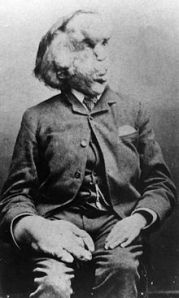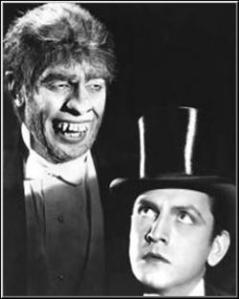What makes a loving husband and father-of-two go on a shooting rampage, murdering sixteen people in their homes, most of them women and children? I don’t know, but Army Staff Sgt. Robert Bales pleaded guilty of it in June. He dodged the death penalty with a life sentence, but his August 19th hearing will determine whether he can ever earn parole.
Dr. Jekyll couldn’t recreate the monstrous serum that released his Mr. Hyde. The same is true of Sgt. Bales, but we know some of the ingredients: contraband alcohol, snorted valium, steroids, and the anti-malarial drug mefloquine which can induce such side effects as hallucinations and psychotic behavior. Bales also suffered PTSD and a traumatic brain injury from multiple deployments.
When asked by a judge why he massacred the Afghan civilians, he answered: “Sir, as far as why — I’ve asked that question a million times since then. There’s not a good reason in this world for why I did the horrible things I did.” He acknowledged that he “formed the intent” of killing each victim, but he didn’t remember also burning their bodies. When pressed, he said, “It’s the only thing that makes sense, sir.”
Sgt. Bales sounds like a confused observer of his own actions. Which he is. We all are.
“Like a rider on the back of an elephant,” argues psychologist Jonathan Haidt, “the conscious, reasoning part of the mind has only limited control of what the elephant does.” Mostly we just sit on top and watch what happens, recording the bumping and jostling of our emotions and actions. We’re not steering the elephant. We just pretend we are. “Then, when faced with a social demand for a verbal justification,” Haidt says, “one becomes a lawyer trying to build a case, rather than a judge searching for the truth.”
“I thought I was doing the right thing,” Bales said after his arrest. The elephant always does the right thing, and it’s our job to prove it—to ourselves and everyone else. The counter evidence was too great for Bales’ lawyer to challenge in court, but Haidt calls us all “intuitive lawyers” defending our elephant-sized intuitions.
I picture a blind lawyer, Daredevil’s alter ego Matt Murdock, arguing why his vigilante-by-night job doesn’t make his legal career complete hypocrisy. There are a range of available justifications (failure of enforcement, police corruption, court incompetence), but none of them are the actual reason he runs around in a skintight unitard with little devil horns beating up bad guys. That’s just something his elephant does.
This sounds like a weirder form of double identity than most superheroes face, but two of Hollywood’s biggest, Batman and Wolverine, encode the same human-animal duality. Comic books stock a zoo of animal men, including, most obviously, Animal Man, and continuing down the alphabetized cages: Ant-Man, Badger, Beast, Black Canary, Black Panther, Blue Beetle, Cat, Catman, Catwoman, Chameleon, Cheetah, Crow, Green Hornet, Hawkman, Hellcat, Howard the Duck, Lizard, Man-Bat, Man-Thing, Man-Wolf, Nite Owl, Penguin, Scorpion, Sabretooth, Toad, Tigris, Vulture, Wasp, and Yellowjacket.
To the best of my memory and search engine abilities, there is no Elephant Man. Not unless you go back to 1884, when the deformed and destitute Joseph Merrick assumed that freak show moniker. Victorians ate him up. Even the Princess of Wales (a queen of animals?) stopped by his bedside to ogle. Advertised as “Half-a-Man and Half-an-Elephant,” Merrick believed his secret origin was the fairground elephant that frightened his pregnant mother. His doctor called him “the most disgusting ” and “degraded or perverted version of a human being” he’d ever seen.
Which explains his ticket sales. Victorians were busy being disgusted by all manner of animal men. H. G. Wells wouldn’t get around to populating Doctor Moreau’s island of half-men for another decade, but Robert Louis Stevenson began his vivisection of humanity’s animal side with his 1882 play, Deacon Brodie, or The Double Life. Professor Brodie of my English department assures me she’s only related to the real-life Deacon by marriage. Even so, you might not trust her with the keys to your home lest her inner elephant feels an atavistic urge to pillage. Deacon William Brodie was an upstanding member of his Edinburgh community until they hung him 1788 for robbing by night the homes he woodworked by day.
Stevenson took four years to expand the two-faced Deacon into The Strange Case of Dr Jekyll and Mr Hyde. The doctor is the ultimate, elephant-straddling lawyer. Jekyll has no control over what his inner Hyde does. Drink, rob, rape, murder, he’s a stampede of animal urges, and when he dies it is with a “dismal screech, as of mere animal terror.”
Victorians were screeching with terror too. Not just of Hyde, but of all such criminal degenerates hiding among their fellow Jekylls. Evolution, they believed, might be slipping backwards into the animal mud which humans had once stood so divinely above. Wasn’t Joseph Merrick’s elephantine deformities evidence enough?
So who will save us from these animal men? Well, oddly enough, other animal men will. Superheroes aren’t like the rest of us. Being “super” means you’re only half-human to begin with. Bruce Wayne would just be another lazy socialite, but instead of abdicating control of his inner beast, he yokes it for his own moral mission. Bat-Man is a Jekyll-controlled Hyde. Beating up degenerates keeps Bruce from degenerating into one of them.
Wolverine has to battle himself to keep his berserker rage under control too. It’s a duality we all experience. Do you just make excuses for your elephant or do you try to seize its reins? It’s scary enough admitting the elephant exists. We aren’t so different from the Victorians. Instead of Darwin skinning our animal side, we have psychologists like Haidt poking their non-rationalist sticks through our cage bars. Who wouldn’t snarl when told their moral reasoning is just ad hoc rationalizations for emotional reflexes? Who wants to work as hard as a self-cage superhero, when it’s so much easier watching from your animal’s free-ranging back?
Perhaps Sgt. Bales is just a degraded version of a human being. Maybe he doesn’t deserve life, let alone parole in twenty years (he’ll be 68). He lost his inner battle against his berserker rage. He was a mere animal when he butchered those families. He needs to be caged. I would like to believe that makes him unique, that he’s a throwback from our animal past. I would like to think other human beings, if placed in the same crucible of environment and chemical horror, would not commit the same atrocity. I want to believe I could never sit before a judge, with my lawyerly hands folded in front of me, and have to say:
“It’s the only thing that makes sense, sir.”



Actually, there is an Elephantmen comic book… I’ve never read it, but would be interested in how it plays into the animal based superheroics you discuss here.
Thanks, Kailyn. I just looked it up, an Image publication around since 2006. According to online summaries, it fits this analysis precisely: the characters are literal human-animal hybrids.
A very wise analysis,Chris. Ironically, the superhero is often seen as the repressive superego of society when, as you persuasively argue, he represents the id…
Can’t it be both? Repressive superego an id? Seems like part of the point of the superhero is split identity….
Then who’s the ego?
Wait– must be the reader!
I thought it was this guy
Heh, Jones, you just gave me a dose in instant nostalgia: back in 2006, some asshole at Wikipedia sought to have tha Ego entry deleted, and I spent a furious week defending it!
It might have sucked, but this reminds me a bit of J. Michael Straczynski’s run on Amazing Spider-Man with the shift in emphasis in Peter Parker’s origin event from the radioactivity to the spider.
At one point Ezekiel makes a similar argument (if I remember correctly), pointing out to Peter the totem-esque nature of his rogue’s gallery (Octopus, Vulture, Scorpion, Kangaroo, Lizard, Puma, etc. . .), suggesting that whatever their conscious motivations for their actions might be, there was an underlying animalistic struggle they were compelled to participate in.
Like I said, JMS’s run of Spider-Man was uneven (at best), but I did appreciate this example of how serialized superhero comics can re-cast events to shift meaning without changing the episodes themselves. It works through accretion. It is simultaneously coincidental and there all along to be inscribed with meaning.
As a creative type with a strong science background that goes back several decades, when brainstorming story ideas, my mind often goes into places the average person’s brain doesn’t.
For example, what if mankind didn’t evolve from apes, but rather, was artificially created two million years ago as a super-ape hybrid via genetic manipulation? A sort of long-forgotten experiment by more advanced visitors who came here, hung around awhile doing research, and left.
And our latent barbarism is merely the unforeseen residual effect of their accelerated artificial evolutionary manipulation — ala the creatures created on H.G. Wells’ fictitious island of Dr. Moreau.
It would account for the fact that our animalistic “monsters from the id” are so close to the surface, our still inexplicable and apparently “sudden” evolution from the apes two million years ago, and the fact that there is no concrete missing link skeletal remains — just a few rare “maybes.” In fact, the best evolutionary smoking gun to date, postulated just a year or so ago, is what was then referred to as “the missing link gene.”
Cue “Twilight Zone” music, please….
It would make a good story anyway — at least as plausible as some of the other SF crap I’ve seen in the past few years.
Maheras, have you ever read James Hogan’s novel Inherit the Stars? It starts with the discovery of a Cro-Magnon skeleton inside a space suit on the moon.
Chris — No, I haven’t read it. Sounds intriguing though!